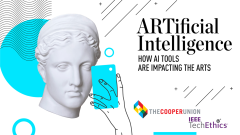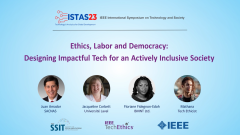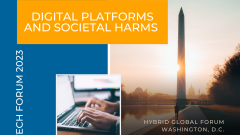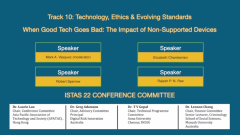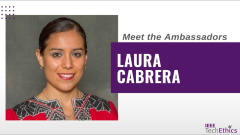Influencing the Next Generation of Engineers via Ethics Education: IEEE TechEthics Panel
About the Talk: This panel explores the opportunities and challenges regarding educating ethical engineers in the 21st century, given the rapid advance and growing complexity of technology.
About the Speakers:
Joe Herkert (moderator) is Associate Professor Emeritus of Science, Technology and Society and a Visiting Scholar in the Genetic Engineering and Society Center, North Carolina State University. He was formerly Lincoln Associate Professor of Ethics and Technology in the Consortium for Science, Policy & Outcomes, Arizona State University (retired May 2015). Herkert has been teaching engineering ethics and science, technology & society courses for thirty years. He is editor of Social, Ethical and Policy Implications of Engineering: Selected Readings (Wiley/IEEE Press, 2000) and co-editor of The Growing Gap between Emerging Technologies and Legal-Ethical Oversight: The Pacing Problem (Springer, 2011), and has published numerous articles on engineering ethics and societal implications of technology in engineering, law, social science, and applied ethics journals.
Deborah G. Johnson recently retired as the Anne Shirley Carter Olsson Professor of Applied Ethics in the Science, Technology, and Society (STS) Program in the School of Engineering and Applied Science at the University of Virginia. Best known for her work on computer ethics and engineering ethics, Johnson’s research examines the ethical, social, and policy implications of technology, especially information technology. Johnson is the author/editor of seven books including most recently, Surveillance and Transparency as Sociotechnical Accountability: A House of Mirrors co-authored with Priscilla Regan (Routledge, 2014). She is currently working on Engineering Ethics: Contemporary Debates for Yale University Press. In addition to her books, Johnson has published over 100 papers in a wide variety of journals and edited volumes.
Deirdre K. Mulligan is an Associate Professor in the School of Information at UC Berkeley, a faculty Director of the Berkeley Center for Law & Technology, and an affiliated faculty on the new Hewlett funded Berkeley Center for Long-Term Cybersecurity. Mulligan’s research explores legal and technical means of protecting values such as privacy, freedom of expression, and fairness in emerging technical systems. Her book, Privacy on the Ground: Driving Corporate Behavior in the United States and Europe, a study of privacy practices in large corporations in five countries, conducted with UC Berkeley Law Prof. Kenneth Bamberger was published by MIT Press. She is a member of the Defense Advanced Research Projects Agency Information Science and Technology advisory board; a member of the National Academy of Science Forum on Cyber Resilience; a Commissioner on the Oakland Privacy Advisory Commission; and a board member of the Center for Democracy and Technology, and the Partnership on AI.
Recorded at the IEEE TechEthics Conference, held on 13 October 2017 at the National Academy of Sciences Building in Washington, DC. The conference was made possible in part by a grant from the IEEE Foundation. Special thanks to the National Academy of Engineering.
About the Talk: This panel explores the opportunities and challenges regarding educating ethical engineers in the 21st century, given the rapid advance and growing complexity of technology.
 Cart
Cart Create Account
Create Account Sign In
Sign In
